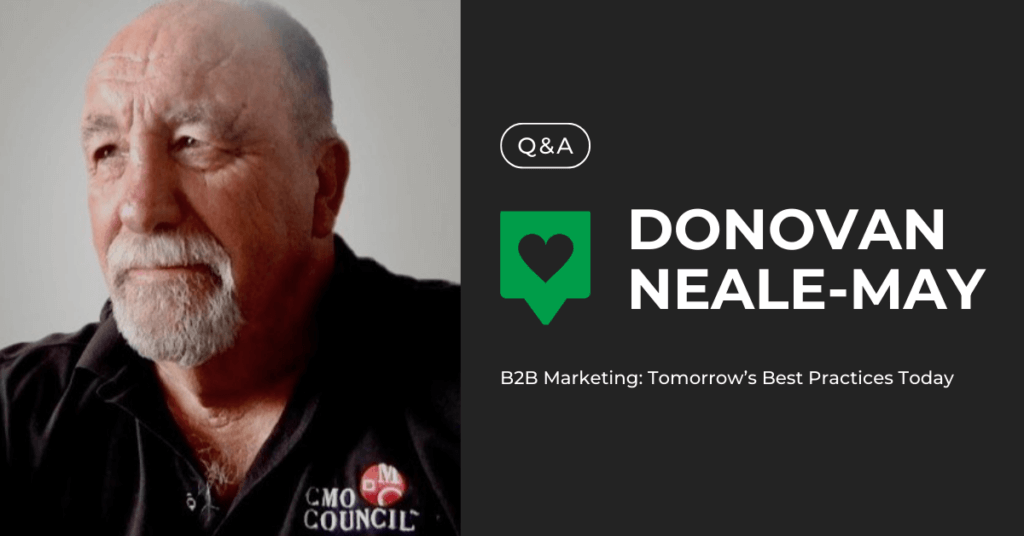Insights from Donovan Neale-May
Donovan Neale-May is a seasoned marketing veteran and respected leader in both the B2B and B2C marketing universe.
He is founder and executive director of the Chief Marketing Officer (CMO) Council, a global community of more than 16,000 senior marketing executives in 10,000 companies controlling nearly $1 trillion in annual, aggregated marketing spend. Donovan is also the executive director of the Business Performance Innovation (BPI) Network.
In addition to his work leading the next wave of growth and innovation marketing, he is president of GlobalFluency, an international demand generation marketing firm working with growing businesses around the world as an innovator in thought leadership content marketing.
His career spans leadership positions in agencies in Silicon Valley, New York, London and Los Angeles. He has consulted with over 300 leading multinational corporations, startups, and emerging companies.
In an interview with Leadtail TV host Bryan Kramer, Donovan shared his perspective on where marketing is today, where he sees the future leading, and the impact of new technologies like generative AI on the field.
This interview has been edited for clarity and length.
Fundamental Changes to the CMO Role
Bryan Kramer: Well, Donovan, it is absolutely wonderful to be here with you today and Leadtail TV. Thank you so much for joining me. To kick it off, I’d love for you to tell us a little bit about the CMO Council and your role there.
Donovan Neale-May: The CMO Council started over two decades ago, initially as an ad hoc group. We hosted a program in Silicon Valley at the Ritz Carlton Half Moon Bay, called the Brand Recovery Summit, which brought together CMOs from various tech and telco companies.
What began as an informal meeting has now grown to over 16,000 members in 10,000 companies across 120 countries. We have seven regional advisory boards and multiple channels for dialogue and engagement, producing a vast amount of thought leadership content.
Our unique value lies in capturing experiential knowledge from practitioners, offering both qualitative and quantitative insights. This repository is invaluable to marketers, students, and faculty members.
Bryan Kramer: The number of marketers involved is astounding. It sounds like there are more of us than I ever realized. Could you talk about how the CMO Council has diversified its audience?
Donovan Neale-May: We’ve expanded our reach significantly. Besides our members, we have over 60,000 additional people in our database who consume our content.
There are many more CMO titles today than there were 20 years ago, and our members collectively control about a trillion dollars in annual spend.
The role of the CMO has evolved, encompassing a range of new responsibilities and relationships within the C-suite, including emerging roles like the Chief AI Officer.
Bryan Kramer: As a former agency owner, I’ve noticed a shift in the confidence levels among marketers. In a recent report by the CMO Council, it was found that over 70% of marketers don’t feel confident in their current sales and marketing model. What are your thoughts on this?
Donovan Neale-May: There has been a fundamental transformation in the marketing function and the requirements to be an effective CMO.
Today’s CMOs need a wide range of skills, from technical and cybersecurity knowledge to functional alignment and integration with channels and e-commerce operations.
Building a relevant marketing stack and unifying data for better decision support is crucial. Marketing today is about making a business case for spend, backed by intelligence and substantiation, rather than just creativity.
The Marketing/Sales Collaboration Tango
Bryan Kramer: One of the critical areas in marketing is the collaboration between marketing and sales. What are the main obstacles that prevent a more collaborative relationship?
Donovan Neale-May: The traditional adversarial roles and lack of understanding between sales and marketing are major obstacles.
Marketers need to drive identification, qualification, activation, and recovery strategies, yet only 30% of companies have a formal strategy for recovering lost accounts.
Marketing should lead in building relationships within key accounts and providing sales intelligence. However, the integration of various tools and technologies and the reluctance of sales to share contact information create silos and functional disassociation.
The Impact of AI for Marketing Professionals
Bryan Kramer: Given the remote shift in the world, how does generative AI fit into today’s marketing landscape, particularly in terms of intent and collaboration between sales and finance?
Donovan Neale-May: Generative AI has broad applicability across all facets of marketing. It can help scale interactions, improve predictive experiences, and create more personalized engagements.
AI can assist in content creation, translation, and cross-cultural adaptation, making marketers more efficient. However, it also requires integration and adaptation, and there are legitimate concerns regarding its environmental impact and the need for substantial compute power.
Looking for more insights into the future of marketing? Check out all our Leadtail TV podcasts!
And if you’re ready to get started boosting your B2B brand on social media, we’d love to start a conversation. Let’s talk!
